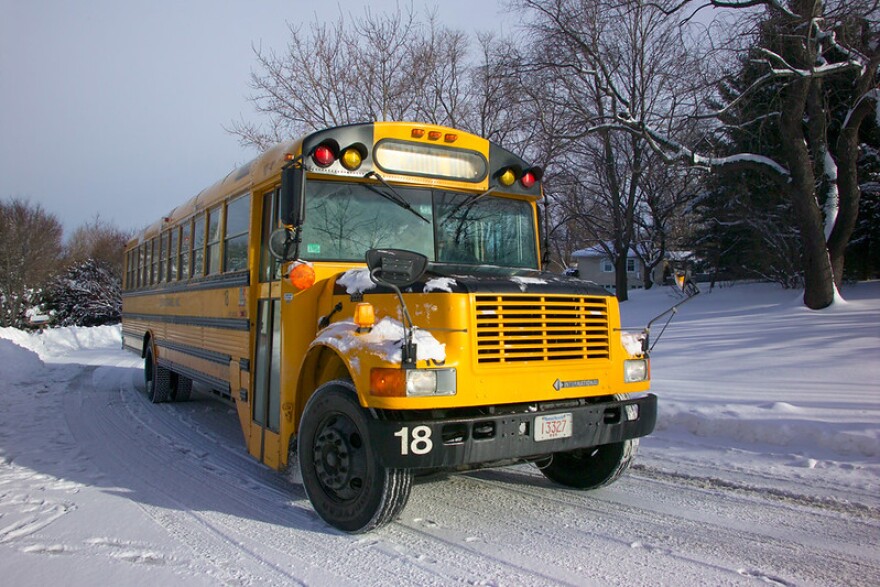The number of confirmed COVID-19 cases in Michigan rises nearly every day.
As the pandemic worsens putting food on the table is getting harder for some in rural communities.
So school districts are rushing to feed students that relied on school lunches.
And food pantries in northern Michigan are trying to feed the rest.
Many worry if the pandemic stretches on, they may not be able to get food to those who need it.
Public schools in Michigan are closed for at least the next few weeks.
But around 40 employees of Benzie Central Schools still reported to work Tuesday morning.
They’re rushing across the high school parking lot... loading thousands of meals on to the district’s fleet of buses.
In 2018 over 700-thousand students in Michigan relied on free-or-reduced cost meals at school.
Benzie Central is one of many districts still offering that food… but it’s one of few that’s actually driving it to families.
Each bus is packed with 240 prepared breakfasts and lunches to deliver.
As they takeoff from school a mother and child that live across the street are standing at the edge of their driveway.. holding a sign that says “Thank you.”
Benzie Central is geographically one of the largest school districts in the state. For socially isolating during the pandemicthat distance is a good thing but when it comes to getting food and resources…
“That ground creates a barrier for a lot of our families.”
That’s Benzie Superintendent Matt Olson. He says parts of the district are rural… low-income… and far from big grocery stores.
Olson says they’ve held food drives before… but many families don’t have the time or resources to make it in-person. This time around.
“We figured if we’re gonna do this the only way to make this successful is to get it to them where they are.”
Despite warnings to avoid crowds and face-to-face contact… many of the district’s employees… like Tina Page are unfazed. She’s been a bus driver for Benzie Schools for 5 years…
All these kids are awesome, and I’m doing a good cause, and I’m healthy and not worried about it.”
Crates of food crammed between seats on Page’s bus rattle against each other… as we travel on dirt roads across Benzie County.
We arrive at one stop where a mother and her 5-year-old son named Will approach the bus. Will is one of Page’s favorite students…
“Hi buddy! Come here… give me a hug…
Page holds him on her lap while co-worker Rebecca Frieholtz gives his mother some meals.
“And then I have more that I have to give you as well…
We got lots and lots of snacks for ya.”
Along the route they gave out three days worth of food to 51 children in one morning.
The district as a whole gave out over 4,000 meals. They plan on doing this for another week while schools are closed. Superintendent Matt Olson says they’ll try to keep delivering food after that… even if schools stay closed longer.
“I see this as a pretty vital service right up there with keeping grocery stores open and keeping pharmacies open and running, is this is getting kids fed.”
In a pandemic like this food pantries in rural communities are also stretched thin.
Val Stone is with the Northwest Food Coalition. They helped feed over 220-thousand people across 6 northern Michigan counties last year.
Stone says they’re already seeing more people show up to pantries and meal sites.
“The need is going to intensify as people run out of supplies that they might have in their pantries. Local pantries are aware of that, the school system’s aware of it and there’s efforts on their part to provide some kind of food in some way.”
The coronavirus has already changed how a lot of food pantries work.
Some have started delivering food or provide drive-thru options to avoid hand-to-hand contact.
And Stone says these organizations normally rely on retirees and senior citizens for help… but those older adults face a higher risk from the disease.
“A lot of the pantries have lost volunteers, voluntarily, or scaled back their efforts on how they’re delivering the food to the clients.”
Stone says more people have offered to work or bring in food. But health and sanitation concerns limit what they can take.
For now, she says they’re waiting on more guidance and potentially cash from the Federal Government to get more food to those in need.
If you’re interested in helping the Food Coalition, you can find more information at their website… northwest m-i food coalition dot org.

